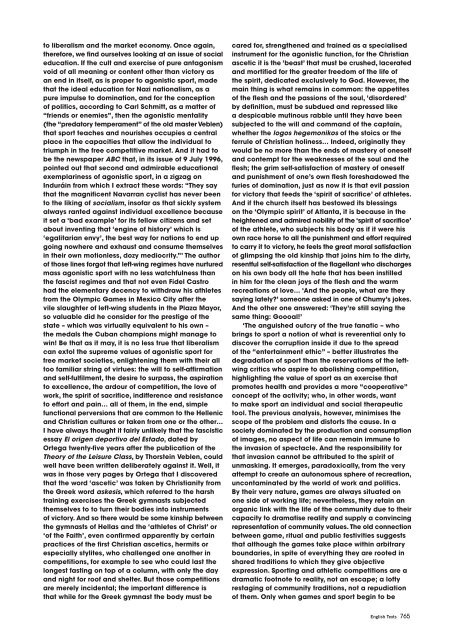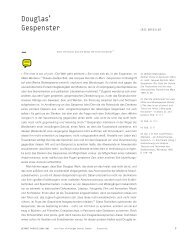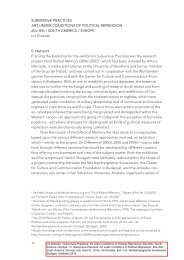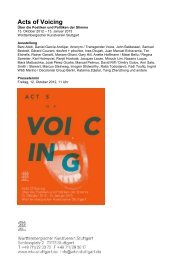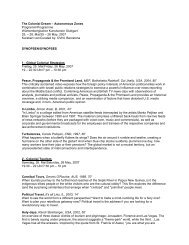English Texts
English Texts
English Texts
You also want an ePaper? Increase the reach of your titles
YUMPU automatically turns print PDFs into web optimized ePapers that Google loves.
to liberalism and the market economy. Once again,<br />
therefore, we find ourselves looking at an issue of social<br />
education. If the cult and exercise of pure antagonism<br />
void of all meaning or content other than victory as<br />
an end in itself, as is proper to agonistic sport, made<br />
that the ideal education for Nazi nationalism, as a<br />
pure impulse to domination, and for the conception<br />
of politics, according to Carl Schmitt, as a matter of<br />
“friends or enemies”, then the agonistic mentality<br />
(the “predatory temperament” of the old master Veblen)<br />
that sport teaches and nourishes occupies a central<br />
place in the capacities that allow the individual to<br />
triumph in the free competitive market. And it had to<br />
be the newspaper ABC that, in its issue of 9 July 1996,<br />
pointed out that second and admirable educational<br />
exemplariness of agonistic sport, in a zigzag on<br />
Induráin from which I extract these words: “They say<br />
that the magnificent Navarran cyclist has never been<br />
to the liking of socialism, insofar as that sickly system<br />
always ranted against individual excellence because<br />
it set a ‘bad example’ for its fellow citizens and set<br />
about inventing that ‘engine of history’ which is<br />
‘egalitarian envy’, the best way for nations to end up<br />
going nowhere and exhaust and consume themselves<br />
in their own motionless, dozy mediocrity.”’ The author<br />
of those lines forgot that left-wing regimes have nurtured<br />
mass agonistic sport with no less watchfulness than<br />
the fascist regimes and that not even Fidel Castro<br />
had the elementary decency to withdraw his athletes<br />
from the Olympic Games in Mexico City after the<br />
vile slaughter of left-wing students in the Plaza Mayor,<br />
so valuable did he consider for the prestige of the<br />
state – which was virtually equivalent to his own –<br />
the medals the Cuban champions might manage to<br />
win! Be that as it may, it is no less true that liberalism<br />
can extol the supreme values of agonistic sport for<br />
free market societies, enlightening them with their all<br />
too familiar string of virtues: the will to self-affirmation<br />
and self-fulfilment, the desire to surpass, the aspiration<br />
to excellence, the ardour of competition, the love of<br />
work, the spirit of sacrifice, indifference and resistance<br />
to effort and pain… all of them, in the end, simple<br />
functional perversions that are common to the Hellenic<br />
and Christian cultures or taken from one or the other…<br />
I have always thought it fairly unlikely that the fascistic<br />
essay El origen deportivo del Estado, dated by<br />
Ortega twenty-five years after the publication of the<br />
Theory of the Leisure Class, by Thorstein Veblen, could<br />
well have been written deliberately against it. Well, it<br />
was in those very pages by Ortega that I discovered<br />
that the word ‘ascetic’ was taken by Christianity from<br />
the Greek word askesis, which referred to the harsh<br />
training exercises the Greek gymnasts subjected<br />
themselves to to turn their bodies into instruments<br />
of victory. And so there would be some kinship between<br />
the gymnasts of Hellas and the ‘athletes of Christ’ or<br />
‘of the Faith’, even confirmed apparently by certain<br />
practices of the first Christian ascetics, hermits or<br />
especially stylites, who challenged one another in<br />
competitions, for example to see who could last the<br />
longest fasting on top of a column, with only the day<br />
and night for roof and shelter. But those competitions<br />
are merely incidental; the important difference is<br />
that while for the Greek gymnast the body must be<br />
cared for, strengthened and trained as a specialised<br />
instrument for the agonistic function, for the Christian<br />
ascetic it is the ‘beast’ that must be crushed, lacerated<br />
and mortified for the greater freedom of the life of<br />
the spirit, dedicated exclusively to God. However, the<br />
main thing is what remains in common: the appetites<br />
of the flesh and the passions of the soul, ‘disordered’<br />
by definition, must be subdued and repressed like<br />
a despicable mutinous rabble until they have been<br />
subjected to the will and command of the captain,<br />
whether the logos hegemonikos of the stoics or the<br />
ferrule of Christian holiness… Indeed, originally they<br />
would be no more than the ends of mastery of oneself<br />
and contempt for the weaknesses of the soul and the<br />
flesh; the grim self-satisfaction of mastery of oneself<br />
and punishment of one’s own flesh foreshadowed the<br />
furies of domination, just as now it is that evil passion<br />
for victory that feeds the ‘spirit of sacrifice’ of athletes.<br />
And if the church itself has bestowed its blessings<br />
on the ‘Olympic spirit’ of Atlanta, it is because in the<br />
heightened and admired nobility of the ‘spirit of sacrifice’<br />
of the athlete, who subjects his body as if it were his<br />
own race horse to all the punishment and effort required<br />
to carry it to victory, he feels the great moral satisfaction<br />
of glimpsing the old kinship that joins him to the dirty,<br />
resentful self-satisfaction of the flagellant who discharges<br />
on his own body all the hate that has been instilled<br />
in him for the clean joys of the flesh and the warm<br />
recreations of love… ‘And the people, what are they<br />
saying lately?’ someone asked in one of Chumy’s jokes.<br />
And the other one answered: ‘They’re still saying the<br />
same thing: Goooal!’<br />
‘The anguished outcry of the true fanatic – who<br />
brings to sport a notion of what is reverential only to<br />
discover the corruption inside it due to the spread<br />
of the “entertainment ethic” – better illustrates the<br />
degradation of sport than the reservations of the leftwing<br />
critics who aspire to abolishing competition,<br />
highlighting the value of sport as an exercise that<br />
promotes health and provides a more “cooperative”<br />
concept of the activity; who, in other words, want<br />
to make sport an individual and social therapeutic<br />
tool. The previous analysis, however, minimises the<br />
scope of the problem and distorts the cause. In a<br />
society dominated by the production and consumption<br />
of images, no aspect of life can remain immune to<br />
the invasion of spectacle. And the responsibility for<br />
that invasion cannot be attributed to the spirit of<br />
unmasking. It emerges, paradoxically, from the very<br />
attempt to create an autonomous sphere of recreation,<br />
uncontaminated by the world of work and politics.<br />
By their very nature, games are always situated on<br />
one side of working life; nevertheless, they retain an<br />
organic link with the life of the community due to their<br />
capacity to dramatise reality and supply a convincing<br />
representation of community values. The old connection<br />
between game, ritual and public festivities suggests<br />
that although the games take place within arbitrary<br />
boundaries, in spite of everything they are rooted in<br />
shared traditions to which they give objective<br />
expression. Sporting and athletic competitions are a<br />
dramatic footnote to reality, not an escape; a lofty<br />
restaging of community traditions, not a repudiation<br />
of them. Only when games and sport begin to be<br />
<strong>English</strong> <strong>Texts</strong> 765


